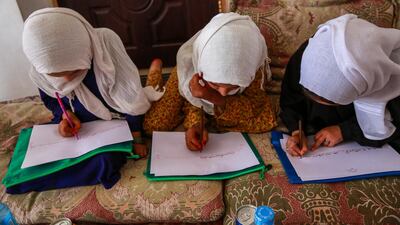An economic crisis, drought and new restrictions since the Taliban took control of Afghanistan a year ago have shattered girls’ lives, excluded them from society and left them hungry, with a quarter showing signs of depression, Save the Children says.
A report by the charity, Breaking Point: Life for children one Year since the Taliban Takeover, shows that 97 per cent of families are struggling to provide enough food for their children, and that girls are eating less than boys.
Almost 80 per cent of children said they had gone to bed hungry in the past 30 days and girls were almost twice as likely as boys to frequently sleep with empty stomachs.
Nine in 10 girls said their meals had been reduced in the past year and that they worry because they are losing weight and have no energy to study, play and work.
The lack of food is affecting girls' health and their future.
The crisis is also taking a dangerous toll on girls’ mental and psychosocial well-being, says the study.
Interviews with their caregivers indicate 26 per cent of girls are showing signs of depression compared with 16 per cent of boys, and 27 per cent of girls are showing signs of anxiety compared with 18 per cent of boys.
Virtual tours of Herat girls' education in Afghanistan - in pictures
Girls reported having trouble sleeping at night because they were worried and had bad dreams.
They said they had been excluded from many of the activities that made them happy, such as spending time with relatives and friends and going to parks and shops.
After the Taliban’s takeover last August, thousands of secondary school girls were ordered to stay home, reversing years of progress for gender equality.
Girls interviewed for the study expressed disappointment and anger over being banned from school and said they felt hopeless about their future because they did not have the rights and freedom they used to have.
More than 45 per cent of girls said they were not attending school, compared with 20 per cent of boys.
Reasons they gave included economic challenges, the Taliban’s ban on girls attending secondary school, and community attitudes.
One year since the Taliban seized power in Afghanistan - in pictures
As international forces left Afghanistan last year and the Taliban took over control, billions of dollars in international aid were withdrawn, the country's foreign currency reserves were frozen and the banking system collapsed.
The subsequent economic crisis and the country’s worst drought in 30 years have plunged households into poverty.
Children interviewed for the study said the economic situation was driving an increase in child marriages in their communities, and that this was affecting girls more than boys.
Of the children who said they had been asked to marry to improve their family’s financial situation in the past year, 88 per cent were girls.
"Parishad", 15, who was interviewed for the study and lives in northern Afghanistan, said she did not go to school because her parents could not afford to feed their children, let alone pay for her books and stationery.
Her family’s situation has rapidly deteriorated in the past 12 months and they were evicted from their home because they could not pay the rent.
The landlord offered to buy one of Parishad’s siblings but her parents refused.
Mobile library visits children in Afghanistan without schools - in pictures
“Some days my father cannot bring food," she said. "My brothers wake up at midnight and cry for food.
"I don’t eat and I save my food for my brothers and sisters. When my brothers and sisters ask for food, I get upset and cry a lot.
"I go to my neighbour’s house and ask for food. Sometimes they’ll help and give me food and sometimes they say they don’t have anything to give me.
“When we left our old house to come to this house, I was deeply upset and I said, ‘Why are we leaving again, why are we facing these problems again?’
"I was deeply angry, and it was a very difficult time and I cried."
“I would love to go to school. When I see other girls going to school, I wish I could go to school too. Every month we change houses and it’s difficult for us to go to school.
"We also don’t have any stationery and we need money to buy books. I can’t tolerate it. I can’t do anything about it.”
Chris Nyamandi, Save the Children's director for Afghanistan, said: "Life is dire for children in Afghanistan, one year since the Taliban took control. Children are going to bed hungry night after night.
"They’re exhausted and wasting away, unable to play and study like they used to. They’re spending their days toiling in brick factories, collecting rubbish and cleaning homes instead of going to school.
“Girls are bearing the brunt of the deteriorating situation. They’re missing more meals, suffering from isolation and emotional distress and are staying home while boys go to school.
"This is a humanitarian crisis but also a child rights catastrophe."
Women protest against Taliban rule in Afghanistan - in pictures
Mr Nyamandi believes the solution cannot be found in Afghanistan alone and global leaders need to provide immediate humanitarian funding, revive the banking system and support the economy.
If these issues are not addressed, he fears "children’s lives will be lost, and more boys and girls will lose their childhoods to labour, marriage and rights violations".
Since the Taliban came sweeping back into power, Save the Children has reached more than 2.5 million people, including 1.4 million children.
The charity is delivering health, nutrition, education, child protection, shelter, water, sanitation and hygiene and food security, and livelihoods support to people in 15 provinces throughout Afghanistan.


































































































